
80.3K
Downloads
79
Episodes
Anaesthesia is the official journal of the Association of Anaesthetists and is international in scope and comprehensive in coverage. It publishes original, peer-reviewed articles on all aspects of general and regional anaesthesia, intensive care and pain therapy, including research on equipment. Rapid Sequence podcasts offer an insight into our journal, publications, editors, reviewers, authors and readers. Each episode is short, concise and packed full of CPD for all your educational needs.
Episodes

Tuesday Aug 29, 2023
Pre-operative gastric ultrasound in patients at risk of pulmonary aspiration
Tuesday Aug 29, 2023
Tuesday Aug 29, 2023
Point-of-care gastric sonography offers an objective approach to assessing individual pulmonary aspiration risk before induction of general anaesthesia. This new paper aimed to evaluate the potential impact of routine pre-operative gastric ultrasound on peri-operative management in a cohort of adult patients undergoing elective or emergency surgery at a single centre.
For this new podcast, Dr Eimear Keane speaks with the authors about how they did it, and the resultant key messages for clinical practice.
Should we all be doing gastric POCUS more?
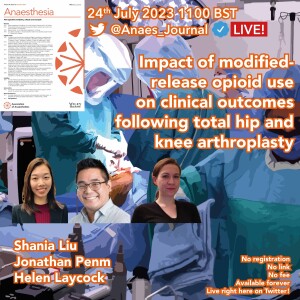
Tuesday Jul 25, 2023
Tuesday Jul 25, 2023
Despite concerns and recommendations, modified-release opioids are still commonly used for the management of acute pain following total hip and knee arthroplasty. There is a need to compare modified-release and immediate-release opioid use following these procedures, and to determine whether the use of modified-release opioids is safe or harmful. The primary objective of this study was to examine the impact of modified-release opioid use on the incidence of opioid-related adverse drug events compared with immediate-release opioid use among adult hospital inpatients following primary total hip or knee arthroplasty.
In this multicentre propensity score matched cohort study, modified-release opioid use in the acute postoperative period is associated with an increased risk of experiencing opioid-related adverse events after total hip or knee arthroplasty compared with those given immediate-release opioids only. Further, patients given modified-release opioids experienced a higher incidence of constipation and in-hospital falls, as well as a longer length of hospital stay compared with patients given immediate-release opioids only.
Join our Editor Dr Helen Laycock as she discusses the study and its implications with the authors.

Tuesday Jul 04, 2023
Tuesday Jul 04, 2023
Neuraxial labour analgesia is a safe and effective method of pain relief. Following initiation of analgesia with epidural or combined spinal-epidural, this can be maintained with continuous epidural infusion, manual intermittent boluses, patient-controlled epidural analgesia (PCEA), programmed intermittent epidural bolus (PIEB) or a combination of these.
This new RCT finds that a PCEA high-volume bolus without a background infusion is not inferior to PIEB for maintenance of epidural labour analgesia and superior regarding local anaesthetic consumption. The results of the study support the use of high-volume bolus techniques, whether as part of PIEB or PCEA, for the maintenance of epidural labour analgesia. The PIEB techniques provide more consistent pain control (less variability), whereas PCEA-only may give women more control over their analgesia.
For this podcast, Dr Louise Savic discussed the methods and resultant implications with the authors.

Wednesday Jun 21, 2023
Timing of elective surgery and risk assessment after SARS-CoV-2 infection: 2023 update
Wednesday Jun 21, 2023
Wednesday Jun 21, 2023
Guidance for the timing of surgery following SARS-CoV-2 infection needed reassessment given widespread vaccination, less virulent variants, contemporary evidence and a need to increase access to safe surgery.
This is the third iteration of consensus guidance around timing of surgery and risk assessment. Find out here why the update was required and what is new for 2023.

Monday Jun 19, 2023
Monday Jun 19, 2023
This new meta-analysis from Hansel et al. is a must read for all. Join Associate Editor Susannah Patey as she speaks with the authors about the key findings and clinical conclusions.
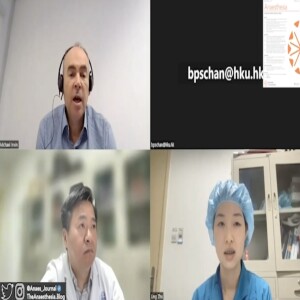
Thursday Jun 15, 2023
Postoperative pulmonary complications and the supraglottic airway device
Thursday Jun 15, 2023
Thursday Jun 15, 2023
The two most commonly used airway management techniques during general anaesthesia are supraglottic airway devices and tracheal tubes. This new study compares their use for elderly patients undergoing low risk surgery with a composite of postoperative pulmonary complications as the primary outcome.
It is a fascinating trial for many reasons and we expect there will be much discussion amongst anaesthetists. Join Prof Mike Irwin and the authors to find out why they did it and a summary of the key clinical messages.
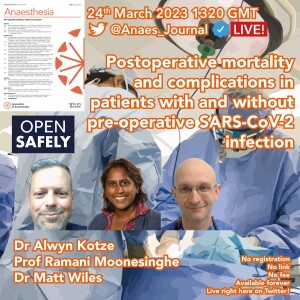
Monday Mar 27, 2023
Monday Mar 27, 2023
Surgical decision-making after SARS-CoV-2 infection is influenced by the presence of comorbidity, infection severity and whether the surgical problem is time-sensitive.
This new paper utilised the OpenSAFELY database to look at practices and outcomes in England, and suggests that some patients can be safely operated within 2 weeks from infection. This podcast goes deeper into the associated issues and implications for clinicians, patients and hospitals.
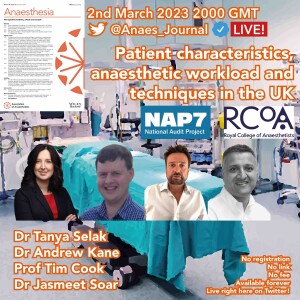
Friday Mar 03, 2023
Patient characteristics, anaesthetic workload and techniques in the UK
Friday Mar 03, 2023
Friday Mar 03, 2023
Detailed contemporary knowledge of the characteristics of the surgical population, national anaesthetic workload, anaesthetic techniques and behaviours are essential to monitor productivity, inform policy and direct research themes. Every 3–4 years, the Royal College of Anaesthetists, as part of its National Audit Projects (NAP), performs a snapshot activity survey in all UK hospitals delivering anaesthesia, collecting patient-level encounter data from all cases under the care of an anaesthetist.
Arguably the most important paper of 2023 so far and essential reading/listening for all!
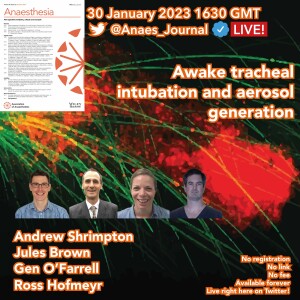
Wednesday Feb 01, 2023
Awake tracheal intubation and aerosol generation
Wednesday Feb 01, 2023
Wednesday Feb 01, 2023
This new paper from the AERATOR group examines the science around aerosol generation and awake tracheal intubation (ATI). Their study was performed on a single day during an ATI course on 12 anaesthetic trainees. They show that ATI without sedation generates high concentrations of respiratory aerosol. Professor Ross Hofmeyr talks to the authors about their study, its clinical implications and what the future holds for research in this area.
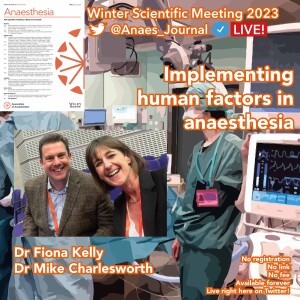
Thursday Jan 12, 2023
Implementing human factors in anaesthesia - live at WSM 2023
Thursday Jan 12, 2023
Thursday Jan 12, 2023
We caught up with Dr Fiona Kelly, lead author of a new guideline from the Association of Anaesthetists and the Difficult Airway Society on human factors in anaesthesia. The guideline and narrative review were published and launched live at the Winter Scientific Meeting in London today and there are several actions that we can all take today to impact patient care.
Time to place less reliance on individual and team excellence to deliver high-quality patient care? We think so. Both papers are free to access and worth reading in full for all.
